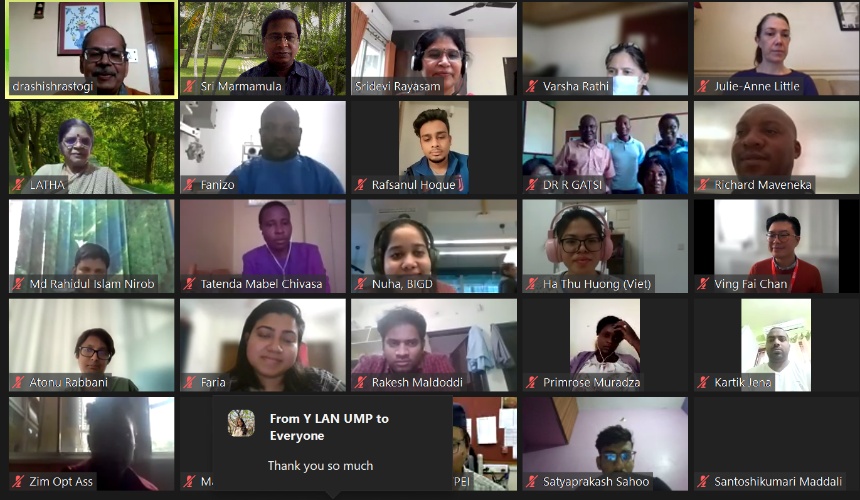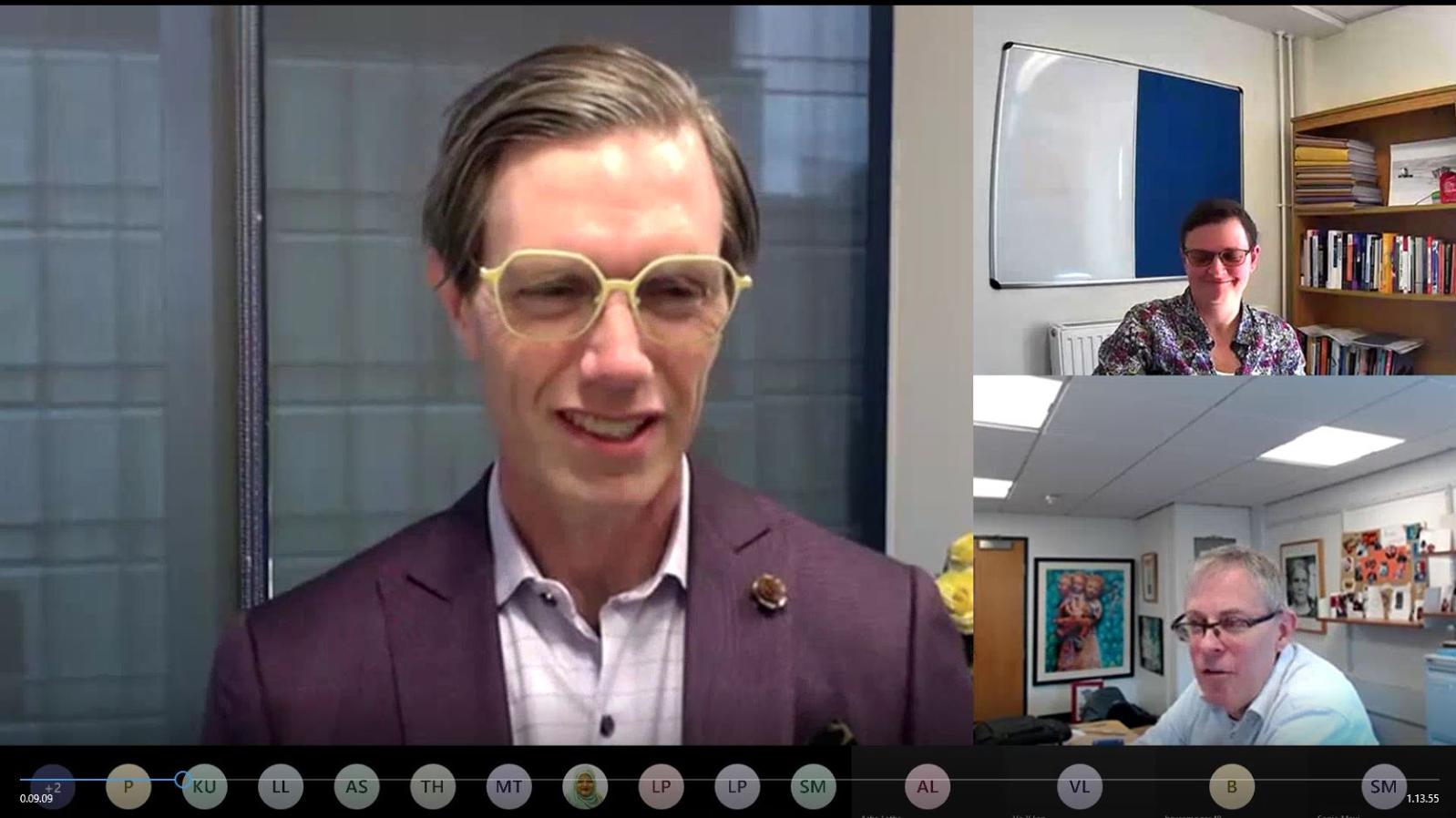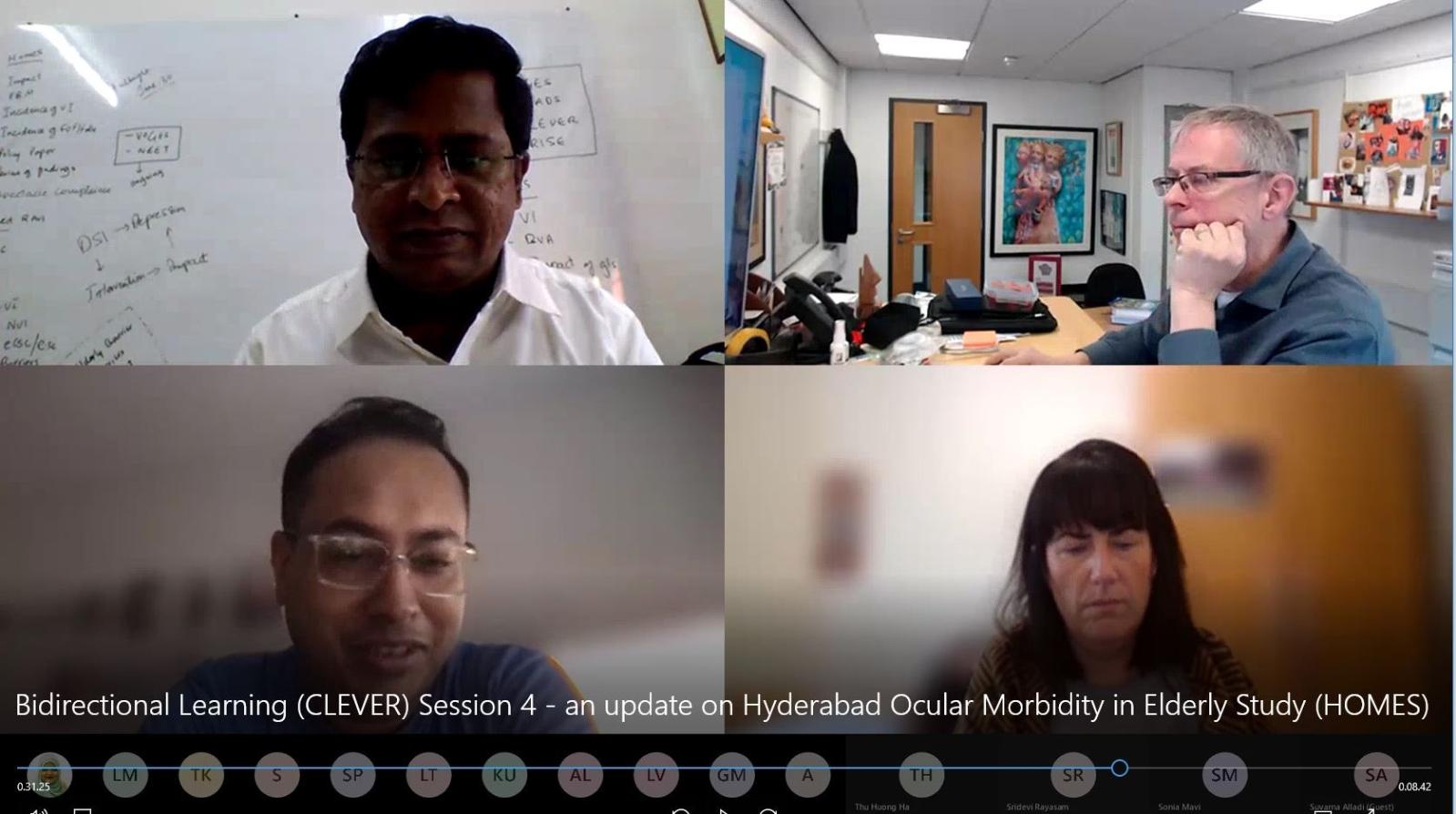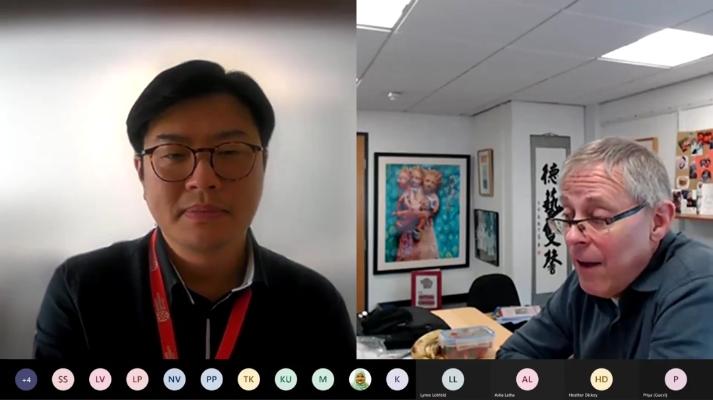Bidirectional learning

Good Clinical Practices (GCP) in Research, Investigator Responsibilities training is organised to ensure those who are involved in the ENGINE project have a globally acceptable standard for the conduct of all four trials (CLEVER, STABLE, THRIFT and ZEAL). It helps the participants to have an overview on the implementation of the research projects as per the principles of GCP.
GCP is an international ethical and scientific quality standard. It guides the design, conduct, record, analyse and report the trials which involve participation of human subjects. Compliance to the GCP standards ensures assurance that the rights, well-being and safety of the subjects are protected. GCP training is an essential aspect of knowledge sharing and learning for all the team members as part of the GCP guidelines. The principles of Declaration of Helsinki and the importance of consistency is reinforced throughout the training.
The role of institutional review boards, principles of GCP, informed consent process, data confidentiality, subject enrolment, safety reporting are included as part of the two-day sessions.
Prof Kevin Frick Speaks About Health Economics

Title: Eye Care Economics: Retrospective and Prospective View
Health economics is the comparative analysis of alternate courses of action in view of both costs and benefits (Drummond etal,.1995).The most common types of economic evaluation used are cost-effectiveness analysis, cost-benefit analysis, cost-utility analysis, cost-minimisation analysis. cost effectiveness analysis helps in analysing the impact when there is differential results in the outcomes and the costs for programs. The inputs required to do an economic evaluation is to identify, measure and assign the value and then compare all the costs and consequences of an intervention.
The session on health economics is an introduction to eye care economics in a nutshell and is included as a learning platform to all the ENGINE team.
Dr Srinivas Marmamula Speaks About Hyderabad Ocular Morbidity in Elderly Study (HOMES)

Title: An update on Hyderabad Ocular Morbidity in Elderly Study (HOMES)
The number of people living with dementia globally will rise from 50 million in 2017 to 131.5 million by 2050. The majority reside in low and middle-income countries (LMICs), where a 223% increase in the burden of dementia is expected from 2015 to 2050. The elderly, at greatest risk for cognitive disorders, also have the highest prevalence of vision impairment, which affects 2.2 billion persons globally. Proof of a causative association between vision correction and the slowing of cognitive decline is needed to potentiate investment in inexpensive vision care for prevention.
HOMES is an epidemiological study conducted among the residents of old age homes to understand the prevalence and risk factors of Uncorrected Refractive Errors (URE) for distance in elderly residents in 'homes for the aged' in Hyderabad, India. The session is to give an overview of the key findings of the study.
Dr Ving Fai Chan speaks about The Theory of Change

Theory of Change will help with a comprehensive description of the need for change and the essential aspects of it in a programme. It facilitates the planning, execution of a programme seamlessly over due course of the life cycle of a programme. It is a process which drives the execution and helps to achieve the outcomes systematically. The problem tree analysis and the log frame analysis culminates to the concept of theory of change
Dr Keshav Kumar J speaks about the Cross cultural issues in Neuropsychological Assessment
The basic cognitive process is common to all human beings. The difference is only in the way it is expressed in different cultures with the influence of the process in culturally-different ways. The influence of different factors of culture on the different domains of cognition is explored. It is required to assess the cultural impact on test performance of the participants.
Ms Mirjam Sadik and Ms Quy Linh speak about the Helmet Law Campaign
Helmet Law in Vietnam: The Vietnamese government passed a resolution on mandatory helmet law for all motor cycle drivers and passengers on roads. Asia Injury Prevention Foundation(AIPF) has played an important role in creating awareness on the use of helmet. With more and more collisions on the road, traffic accidents are one of the major cause of death in South east Asia. Promoting helmets use is one of the important mission of AIPF.
Dr Priya Thomas speaks about Early Functional Rehabilitation for Dementia
Dementia is one of significant public health problem among the elderly. Functional rehabilitation help to reduce the functional disability and improve the quality of life. Dementia affects people in different ways and is not in a sequence. Integration of people with dementia to the mainstream community is an important aspect of dementia care. A multidisciplinary team plays an important role in providing the services and improving the health aging to the patients effected with dementia. Adaptation of the strategies for promoting independence among the patients with dementia are essential to facilitate and sustain the benefits.
Dr Suvarna Alladi speaks about the STRiDE Project: Filling Research evidence gap for dementia care
STRiDE is Strengthening responses to dementia in developing countries. The project is in seven low and middle income countries(India, Brazil, Kenya, Indonesia, Jamaica, Mexico and South Africa) led by the London School of Economics and Political Science. This is funded by UKRI GCRF with the aim of bridging gaps in evidence to help facilitate advocacy and development of a national dementia plan,policy or programme.
Dr Lynne Lohfeld speaks about the Qualitative Aspects of the ENGINE Project
Qualitative process is an inquiry to understand social or human problems in natural settings. Mixed methods research is a research design that answers questions from multiple perspectives through conducting quantitative and qualitative studies in the project. It hleps to better understand a research question.Quantitaive is about “what” and “how much” while qualitative is to explore “meanings and understandings”.
Cartoons play a critical role in stimulating and encouraging the learning process. The influence of comics and cartoon illustrations is an important factor of communication to promote awareness, impart knowledge and influence the health behaviour. The cartoon based approach is included to create awareness and promote compliance of using glasses in ZEAL trial(one of the ENGINE suite of studies).
The need and importance of large randomised trials in creating evidence is highly significant. The different aspects of randomised trials is discussed in the presentation
The measure of human capital appears to have a stronger relationship with economic growth, both individually and jointly. This is probably because alternative measures of human capital rely largely on years of schooling and omit learning. More on LAYS is given in the session.
Professor Mike Clarke gave an Introduction to Systematic Reviews
Systematic reviews provides the basis for reliable knowledge and are vital to well-informed decision making in the area of health care. Join us to watch and learn more from an interesting session from Prof Mike Clarke.
Dr Joshua Ehrlich speaks on Vision, Cognition and Dementia- Current Understanding and Future direction
The association of vision and cognitive function and the risk it contributes to dementia. Let us learn from Dr Joshua Ehrlich, another interesting bidirectional session of ENGINE.
Mr Enam Haque speaks on Social screening – THRIFT study
The process of social screening to sort the participants based on the socio-economic status is explained by Mr Enam Haque, MOMODa Foundation.
Ms. Tigere Deborah speaks on The Role of CBM in Eye Health and Public Health
An inclusive world in which all persons with disabilities enjoy their human rights and achieve their full potential" is the mission on which CBM team work is committed to work together. Let us hear to Ms Tigere Deborah speak on the role of Christian Blind Mission in eye health and public health.
The suggestion of a law, detection of an idea, work done by people- the framework for thinking on the history of evidence synthesis- let us listen to all of it from Prof Mike Clarke.
Prof Paul Glewwe speaks on Economics
Let us hear from Prof Paul Glewwe on "How Economists think and measure".
Prof Salissou Moutari speaks on Artificial Intelligence and Eyecare
Let us hear Prof Salissou Moutari on "Leveraging AI to improve cataract surgery outcomes & PCO- Implications to Global Eye Health".
LV Prasad Eye Institute speaks on iHOPE
iHOPE is a collaborative and interdisciplinary research programme of LVPEI.
Prof Gianni Virgili speaks on Systematic Reviews
Let us listen to Prof Gianni Virgili talking on the Methodology for Systematic Reviews.
Dr Prabhath Piyasena speaks on Systematic Reviews
The different approaches to Systematic Review- A session from Prabhat Piyasena.
Dr Joshua Ehrlich about The Aging and Cognitive Health Evaluation in Elders (ACHIEVE) study
Let us hear from Dr Joshua Ehrlich about ACHIEVE study.
You can download the recording of the workshop here.
